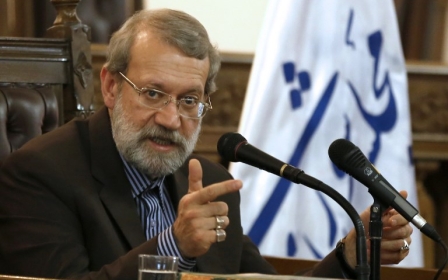Iraqi Shia cleric Muqtada al-Sadr meets Saudi crown prince

Influential Shia cleric Muqtada al-Sadr met with the Saudi crown prince, Mohammed bin Salman, on Sunday in a rare trip to the kingdom.
Little information has been publicly given about the reasons for the trip, which Sadr's office described as his first in 11 years.
“We have been very pleased with what we found to be a positive breakthrough in Saudi-Iraqi relations, and we hope it is the beginning of the retreat of sectarian strife in the Arab-Islamic region,” a statement from Sadr’s office said, following the meeting in Jeddah.
Sadr was initially seen on Sunday greeting Thamer al-Sabhan, Saudi's former ambassador to Iraq, who was replaced in February after criticising Iraq's Shia-dominated Popular Mobilisation Units (PMUs).
"His eminence Sayyed Muqtada Sadr, may God have mercy on him, goes to visit Saudi Arabia at an official invitation," said his office in a statement ahead of the visit.
According to Kurdistan24, Salman and Sadr discussed the future of Iraq and the impact of the 25 September Kurdistan independence referendum. Both reportedly stressed a need for a unified Iraq, while acknowledging increasing tensions between Erbil and Baghdad.
A fierce Iraqi nationalist, Sadr has recently been highly critical of the influence of Saudi's regional rival Iran in Iraq and neighbouring Syria.
In April he broke with other Shia leaders in the Middle East in calling for Syria's ruler Bashar al-Assad to step down.
"I would consider it fair for President Bashar al-Assad to resign and leave power, allowing the dear people of Syria to avoid the scourge of war and terrorist oppression," he said in a statement.
Iran has been Assad's staunchest backer in the region and numerous Iraqi PMU fighters have travelled to Syria to combat the Islamic State (IS) group and opposition groups seeking Assad's overthrow.
In April, Sadr told Middle East Eye that "sectarian" PMUs have no place in Iraq.
Speaking from his home in Najaf, he told MEE that he favoured urgent dialogue with Iraq's Sunni politicians so as to prevent sectarian clashes once the country no longer has a common enemy in IS.
"I'm afraid that the defeat of Daesh [Islamic State] is only the start of a new phase. My proposal is inspired by fear of sectarian and ethnic conflict after Mosul's liberation," he said.
"I want to avoid this. I am very proud of Iraq's diversity but my fear is that we may see a genocide of some ethnic or sectarian groups."
Relations between Saudi Arabia and Iraq were severed after Saddam Hussein's invasion of Kuwait in 1990 and were only re-established in 2015.
Last month, Iraq's prime minister Haider al-Abadi met King Salman in Saudi Arabia in a bid to strengthen ties between the two countries.
"The countries agreed to establish a coordination council to upgrade relations to the hoped-for strategic level and open new horizons for cooperation in different fields," said the statement carried by the official Saudi Press Agency.
It said the two countries had achieved a "quantum leap" in bilateral relations and stressed the importance of further official visits.
Iraq has been keen not to be seen as taking a side in the dispute between Saudi Arabia and Qatar, which has seen a number of Arab states blockading the country.
However, others have suggested that Iraq and Qatar have grown closer since the crisis hit.
The foreign minister of Qatar, Sheikh Mohammed bin Abdulrahman al-Thani, visited Iraq in May, and promised that Qatar would open an embassy in Baghdad in the near future.
This article is available in French on Middle East Eye French edition.
Stay informed with MEE's newsletters
Sign up to get the latest alerts, insights and analysis, starting with Turkey Unpacked
Middle East Eye delivers independent and unrivalled coverage and analysis of the Middle East, North Africa and beyond. To learn more about republishing this content and the associated fees, please fill out this form. More about MEE can be found here.




